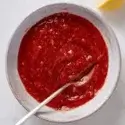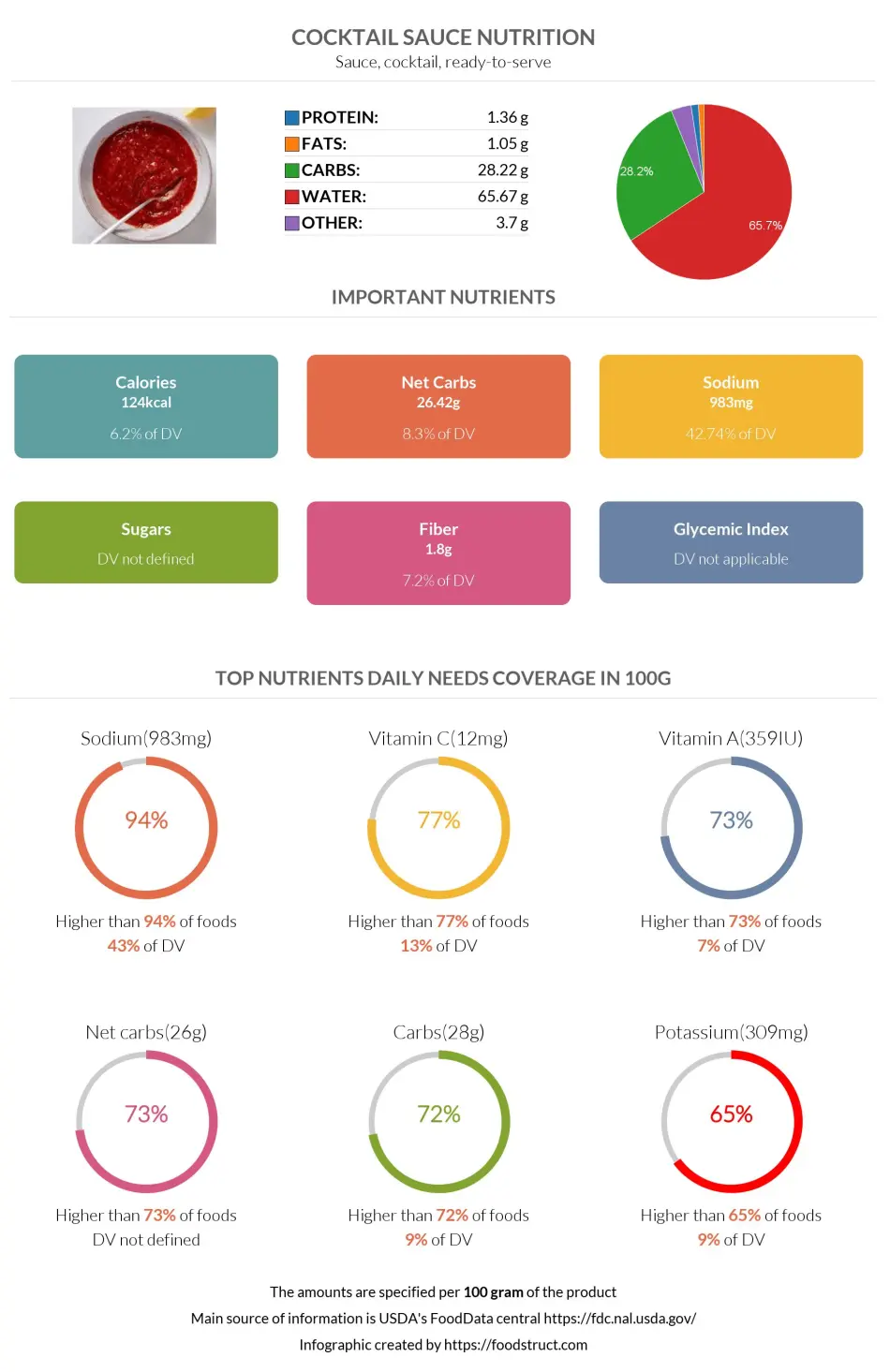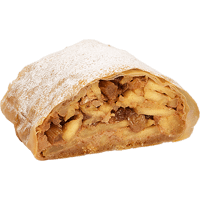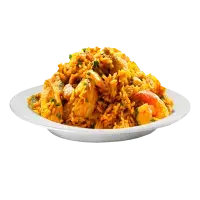Cocktail sauce nutrition: calories, carbs, GI, protein, fiber, fats

Carbs in cocktail sauce
The cocktail sauce contains 28.2g of carbohydrates per 100g of sauce. Considering that cocktail sauce is mainly composed of water and carbs are the second most distributed macros.
In the below chart, we can see the distribution of all the macros.
Macronutrients chart
Net carbs in cocktail sauce
Per 100g of cocktail sauce, we have 26.4g of carbohydrates. This sauce is high in carbohydrates since the base is mostly ketchup.
Fiber distribution in cocktail sauce
Since cocktail sauce is mainly composed of water, carbs
This is equal to 7% of the DV.
Fiber content ratio for Cocktail sauce
Carbs per serving size
The serving size of cocktail sauce is 0.25 cups; in equivalence, half a cup of cocktail sauce equals 60g.
The total carbohydrate amount of a serving size is equal to 16.9g. In addition to that, the net carbohydrates are equal to 15.8g.
The fiber content in a serving size is equal to 1.1g.
Comparison to other foods
The cocktail sauce can be compared to foods similar to it in classification. The table below highlights some of the important foods.
| Food | Carbohydrates (per serving) | Carbohydrates per 100g |
| Cocktail sauce | 16.9g (60g) | 28.2g |
| Tomato sauce | 13.0g (245g) | 5.31g |
| Worcestershire sauce | 3.3g (17g) | 19.46g |
| Barbeque sauce | 6.9g (17g) | 40.77g |
Top nutrition facts for Cocktail sauce

| Calories ⓘ Calories for selected serving | 124 kcal |
| Net Carbs ⓘ Net Carbs = Total Carbohydrates – Fiber – Sugar Alcohols | 26 grams |
| Default serving size ⓘ Serving sizes are mostly taken from FDA's Reference Amounts Customarily Consumed (RACCs) | 0.25 cup (60 grams) |
| Acidity (Based on PRAL) ⓘ PRAL (Potential renal acid load) is calculated using a formula. On the PRAL scale the higher the positive value, the more is the acidifying effect on the body. The lower the negative value, the higher the alkalinity of the food. 0 is neutral. | -5.5 (alkaline) |
Cocktail sauce calories (kcal)
| Calories for different serving sizes of cocktail sauce | Calories | Weight |
|---|---|---|
| Calories in 100 grams | 124 | |
| Calories in 0.25 cup | 74 | 60 g |
| Calories for different varieties of cocktail sauce | Calories | Weight |
|---|---|---|
| Sauce, cocktail, ready-to-serve (this food) | 124 | 100 g |
| Sauce, enchilada, red, mild, ready to serve | 30 | 100 g |
| Sauce, duck, ready-to-serve | 245 | 100 g |
Mineral coverage chart
Mineral chart - relative view
Vitamin coverage chart
Vitamin chart - relative view
All nutrients for Cocktail sauce per 100g
| Nutrient | Value | DV% | In TOP % of foods | Comparison |
| Vitamin A | 18µg | 2% | 44% | |
| Calories | 124kcal | 6% | 67% |
2.6 times more than Orange
|
| Protein | 1.4g | 3% | 82% |
2.1 times less than Broccoli
|
| Fats | 1.1g | 2% | 74% |
31.7 times less than Cheese
|
| Vitamin C | 12mg | 13% | 23% |
4.6 times less than Lemon
|
| Net carbs | 26g | N/A | 27% |
2.1 times less than Chocolate
|
| Carbs | 28g | 9% | 28% |
Equal to Rice
|
| Cholesterol | 0mg | 0% | 100% |
N/A
|
| Vitamin D | 0µg | 0% | 100% |
N/A
|
| Magnesium | 17mg | 4% | 68% |
8.2 times less than Almonds
|
| Calcium | 26mg | 3% | 47% |
4.8 times less than Milk
|
| Potassium | 309mg | 9% | 35% |
2.1 times more than Cucumber
|
| Iron | 0.83mg | 10% | 66% |
3.1 times less than Beef broiled
|
| Sugar | 12g | N/A | 37% |
1.3 times more than Coca-Cola
|
| Fiber | 1.8g | 7% | 39% |
1.3 times less than Orange
|
| Copper | 0.11mg | 12% | 48% |
1.3 times less than Shiitake
|
| Zinc | 0.38mg | 3% | 76% |
16.6 times less than Beef broiled
|
| Phosphorus | 30mg | 4% | 84% |
6.1 times less than Chicken meat
|
| Sodium | 983mg | 43% | 6% |
2 times more than White bread
|
| Vitamin E | 1.1mg | 7% | 45% |
1.4 times less than Kiwi
|
| Selenium | 2.2µg | 4% | 76% | |
| Manganese | 0.15mg | 6% | 56% | |
| Vitamin B1 | 0.02mg | 2% | 86% |
12.7 times less than Pea raw
|
| Vitamin B2 | 0.05mg | 4% | 82% |
2.8 times less than Avocado
|
| Vitamin B3 | 0.82mg | 5% | 71% |
11.7 times less than Turkey meat
|
| Vitamin B5 | 0.07mg | 1% | 92% |
16.6 times less than Sunflower seeds
|
| Vitamin B6 | 0.08mg | 6% | 70% |
1.5 times less than Oats
|
| Vitamin B12 | 0µg | 0% | 100% |
N/A
|
| Vitamin K | 4.4µg | 4% | 57% |
23.1 times less than Broccoli
|
| Folate | 17µg | 4% | 51% |
3.6 times less than Brussels sprouts
|
| Choline | 11mg | 2% | 84% | |
| Saturated fat | 0g | 0% | 100% |
N/A
|
| Monounsaturated fat | 0g | N/A | 100% |
N/A
|
| Polyunsaturated fat | 0g | N/A | 100% |
N/A
|
| Caffeine | 0mg | 0% | 100% | |
| Omega-3 - EPA | 0g | N/A | 100% |
N/A
|
| Omega-3 - DHA | 0g | N/A | 100% |
N/A
|
| Omega-3 - DPA | 0g | N/A | 100% |
N/A
|
Check out similar food or compare with current
NUTRITION FACTS LABEL
Serving Size ______________
Health checks
Cocktail sauce nutrition infographic

References
All the values for which the sources are not specified explicitly are taken from FDA’s Food Central. The exact link to the food presented on this page can be found below.



